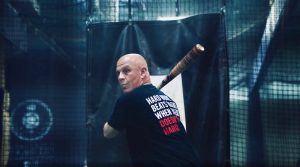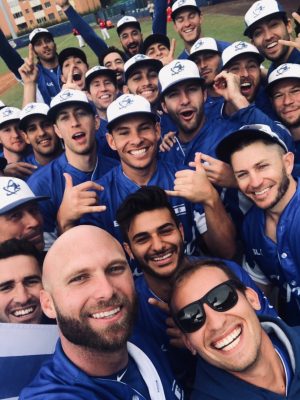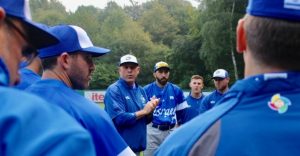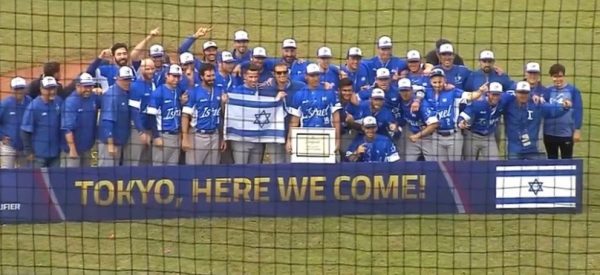That Guy in the Commercial? He’s Going to the Olympics

By Dana White
The 30-second commercial was in heavy rotation all summer. Closeup on a middle-aged guy, very fit, with a shaved head, a soul patch and serious swagger. He lifts weights, throws pitches, swings a bat, while his voiceover describes the orthopedic surgery that saved his baseball career 15 years earlier: “At 39, I had a SLAP tear and ripped off my biceps tendon. Never pitch again? Yeah, right. I went to Montefiore Orthopedics and begged Dr. Levy to get me back on the diamond. At 41, I was drafted to play pro ball.”
While compelling, the TV spot left millions of viewers scratching their heads: Who drafted a regular guy over 40 to play pro ball?
That would be Israel. In 2006, after a year of rehabbing from the surgery with his typically insane work ethic, the 6’1” Eric Holtz was drafted to play for the new Israel Baseball League (IBL). He was a baseball-obsessed married father of three from White Plains with a women’s clothing business moonlighting as a hitting coach at Manhattanville College. The IBL lasted a year, but the connections he made in Israel paid off bigtime down the line. In 2017, he was named manager/coach of Israel’s national baseball team. In September, the “blue and white” advanced to the Africa/Europe Qualifying Event in Italy—-and won it all, earning a berth at the 2020 Olympic Games in Tokyo. The Jerusalem Post called it a “miraculous accomplishment…. Manager Eric Holtz brought old-fashioned baseball to life, playing games one at a time.”
Life Lessons
Most days you can find Holtz behind his desk at Game On 13, his elite training center in Elmsford. Holtz’s big personality is somewhat subdued. The soul patch has grown out to a salt and pepper stubble. That and his shaved head make him a double for Bruce Willis from certain angles. At 54, he’s mulling over a big year—the commercial, the Olympics, the wedding of his oldest child Jordan—and perhaps wondering what his present “whole crazy world” holds.
“I had no idea I was going to be on TV every night,” he says, meaning it. “I had no idea I was going to be on 11 billboards and in magazines and newspapers. I get it every day playing baseball: Oh, you’re the Montefiore guy! But I don’t want to lose focus on what I do. I’m just Eric, head coach of Israel baseball. Owner of Game On 13. It doesn’t change anything.”
His jam-packed office reflects his 24/7 commitment to baseball—and his entrepreneurial know-how. There are jerseys for the Fury and Lady Fury, his 13-team youth league, and one of his signature Holtz wood bats, made in upstate New York. The wall behind his desk is covered in photographs and motivational sayings and a photo of Lou Gehrig and Babe Ruth, an homage to his late father, who told stories about watching the two legends play at the old Yankee stadium. Samson, Holtz’s massive Bernese mountain dog and “best buddy,” is collapsed on the floor like a small mountain to be stepped over. Samson is in the Montefiore footage as well, frolicking with Holtz in the cavernous batting cage area. Dozens of T-shirts and jerseys with college logos hang high on the walls, signifying schools where the kids that train here have gone on to play. Coaching and motivating young people to be their best is his favorite part.
“Not everybody’s going to be a professional player, but the game teaches you to work hard and be part of something bigger than yourself—part of a team, a culture. It teaches you about life.”

The Boy from the Bronx
Holtz calls his business Game On 13 because that’s his lucky number, the one on his jerseys throughout his own playing career. It started in the Bronx, where Holtz was born. He lived in Co-op City with his parents, Philip and Rosalind Holtz, and his older brother Steven. His dad was an accountant who passed his love of baseball down to Eric. He played catch and got on the floor to hold his son’s feet in the correct batting stance. But Philip Holtz also suffered from polycystic kidney disease and required dialysis three times a week. “I played catch with my dad until he got too sick to,” Holtz recalls. “It was a lot to ask of a guy to take me to the park and play with me, because he was exhausted. But he always did.”
After Holtz’s father passed away at age 51, baseball filled a void. Two of his Little League coaches, both Puerto Rican, “almost adopted me as their own,” including him in holidays and family vacations, “to make sure I wasn’t alone.” (His brother Steven, a retired attorney, “is not a baseball guy.”) His father had been religious, and at age 13 his mother and a relative took Eric to Jerusalem for his bar-mitzvah at the Wailing Wall “out of respect for my father.” Holtz went onto attend New Rochelle Academy, where he was a varsity shortstop and pitcher.
In college, he butted heads with his coach. During the season, he left school to attend the funeral of a close friend who died in a car accident. “When I came home, the coach told me to clean out my locker. I’d let my teammates down. He didn’t want me. I didn’t pick up a baseball again until I was 35.”
Back in the Game
Fortunately, there were softballs to pick up. After getting a two-year degree in physical education, Holtz entered the apparel industry in marketing and sales. When he wasn’t traveling the world for a women’s clothing line — doing well enough to buy his own co-op in Hartsdale at the age of 21 — he was playing in several fast-pitch softball leagues in the city. He showed up for his own wedding in 1991 with three broken ribs from sliding into second. His fiancé told him to suck it up and smile for the photos.
“We should have frequent flier miles at the hospital,” says Traci Holtz today. “He’s always breaking something, coming home with a big raspberry on his leg.” The two met in summer camp as kids and reconnected when working in the fashion industry. Traci now works as an administrator in the Mount Pleasant Central School District, overseeing student support services. “Being his wife is accepting that baseball is a big love of his life; it’s part of the package.”
Holtz honed his natural coaching talent on his own kids. All three were standouts at Valhalla High School and have played in college: Jordan, 26, at Bucknell University; daughter Sydni, 22, at NYU; and Brett, 20, at Columbia University, where he’s a junior. According to Holtz, all this diamond time kept his kids “away from video games and helped get them into great schools.”
For Sydni, a pediatric oncology nurse at Memorial Sloan Kettering Cancer Center, playing ball was a given. “From the moment I can remember anything, we have been breathing baseball and softball. I don’t think we had a choice necessarily. Baseball is important to my dad because of losing his father when he was young…. The bond between us with the sport didn’t compare to any other sport we tried.”
But Holtz’s sour college experience gnawed at him. In the year 2000, at age 35, he signed up for the first of several trips to New York Yankees Fantasy Camp in Tampa, Fla., where regular people pay to play and hang out with real live retired Yankees. The experience “rekindled my love and my passion for baseball.” He got into age-group open league baseball and started “killing it” as a third baseman/pitcher. “I’m making the All-Star game every year, playing against kids half my age. It came back quick. I got so enthralled with it, the more I did it, the more I wanted to do it. Before you know it, I was going to Florida and Puerto Rico with travel teams, looking for more and better competition. I was playing so much I hurt my shoulder. I was broken.”
A Stitch in Time
For repairs, Holtz went to a good friend and softball teammate: Dr. Martin Levy, an orthopedic surgeon at Montefiore. “I talked him into fixing me. He said, ‘Why don’t you just stop pitching and play first base?’ And I said ‘Marty, I’m not ready for that! I’ve got a lot more life left in me!’” Levy did the surgery. Little did they know that years later, “I’d be contacted to do a feel-good story for Montefiore,” says Holtz. Doctor and patient also starred in “Eric’s Story,” a short film that ran on the YES Network. “Without that surgery later in life, none of this would have happened.”
Sometimes life takes a lucky hop. After his rehab, an old friend told Holtz about this new venture called the Israeli Baseball League. “I said, ‘There is no baseball in Israel. None. Zero.’” The IBL was the quixotic dream of a millionaire Boston bagel maker who wanted to bring baseball to his spiritual homeland. They were having tryouts in the Berkshires. Holtz went “on a goof.” He made the six-team league as a player/coach for the Bet Shemesh Blue Sox and spent two months playing in Israel, which has only one lighted field.
He got $2,000 for the season and a wise-cracking star turn in a documentary about the league called Holy Land Hardball. But his pro debut paid off in other ways. In 2013 he was a hitting coach at Westchester Community College when a former IBL teammate recruited him as assistant coach to America’s 18 and under team in the Maccabiah Games (a.k.a. “the Jewish Olympics”). Team USA won gold, and in 2017 Holtz returned as head coach. They won again, this time with son Brett playing first base. The next day, Peter Kurz, President of the Israel Association of Baseball, hired Holtz to coach the Israeli national team. “Eric is dedicated, a true mensch, high energy, a great motivator,” says Kurz. “We needed a guy like him.”

Ascending to a New Level
Baseball remains a tough sell in Israel, a country the size of New Jersey with only 1,000 players. “Baseball requires patience, and the Israelis are not a patient people,” Holtz explains. “When you’re a kid you could wait five innings and not have a ball hit to you. Soccer and basketball are nonstop. Israel is not the baseball mecca of the world, but we have proven a lot of people wrong so far. We can compete with anybody out there.”
Most of Team Israel’s players are American Jews who played college and professional ball. Because they have to be Israeli citizens for Olympic competition, Kurz arranged for all of them to obtain citizenship in Israel, a process called Aliyah, Hebrew for “ascending.”
“Eric and I met a year and a half ago and I laid out the plan,” Kurz explains. “I told him how I intended to bring American Jewish players on Aliyah. How we needed to win three tournaments in eight weeks in order to reach the Olympic qualifiers. How we could do well if our pitching held up, and how we could reach the Olympic Games in Tokyo. He looked at me like I was crazy, but immediately bought in because he has that crazy streak as well.” Combined with the addition of six former MLB players, Team Israel had never been stronger.
The roster includes local legend Jonathan de Marte, the 2010 and 2011 New York State Gatorade Player of the Year from Yorktown Heights. He played for the University of Richmond and for independent leagues before Holtz recruited him for Team Israel. “Eric calls and says, I’ve watched you play for years, but I had no idea you were Jewish!” says de Marte, who calls Holtz “one of the most positive, uplifting people I’ve ever met. He reminded us every day what we were playing for, who we were playing for, how it’s on the international stage with all these eyes watching us. Thanked us for the effort we were putting in. He makes you feel your worth.”

Close to the Heart
Throughout their march to the Olympics—Bulgaria, Lithuania, Germany, Italy—Holtz was flying back home to run Game On 13 and squeeze in his own game time. The training center has become a home base for Team Israel players like pitcher Gabe Cramer, a Stanford graduate who plays on an L.A. Dodgers’ minor league team. Cramer says that for what Holtz lacked in professional baseball experience as a manager, he made up for in passion.
“Eric is very outspoken. He wears his emotions on his sleeve. He was able to rally the team and make us feel like we were all chasing a common goal.”
Holtz wears his emotions elsewhere, too. In 2011, his mother’s death prompted him to leave the apparel business and open Game On 13. “Her journey through pancreatic cancer is what made me change my career and do something I love every day, because you’re not promised tomorrow.” He pulls down his shirt collar to reveal two faces tattooed on his chest. “My parents are with me everywhere I go.”
Philip and Rosalind Holtz were with their son as he led Team Israel to win after win in Europe. Holtz remembers how, “whenever the Israeli national anthem played, my hand was covering both of my parents.” His voice breaks, his eyes mist up. “I was thinking of how proud they would be.”
In early September, Team Israel arrived in Bonn, Germany, for the European Championships days before the 47th anniversary of the 1972 Munich massacre, where Palestinian terrorists murdered 11 members of the Israeli Olympic team. They were the first Israeli athletic team to compete in Germany since 1976. One team member’s grandparents had survived Auschwitz.
“The experience transcended baseball,” Holtz recalls. “Looking around and understanding that 70 years prior I would’ve been killed just for being there. To compete against Germany and beat them on their soil was kind of life changing for me.” Israel won a close and emotional game 5-4, before appreciative German fans. Holtz holds up the game ball, the only one he kept.
With a gleam in his eye, Holtz recounts the pep talk he gave on the team bus in Italy, with the Olympic Games on the line. “I pride myself on being incredibly even keeled during the game. Now, pregame? Postgame? I’m a lunatic. Five minutes before we got to the stadium I stood up and said, ‘Gentlemen, there’s nothing left to say. If you take care of business today, we leave the hotel as a baseball team and we come back as Olympians.’ And the bus erupted.” They trounced South Africa 11-1.
Next Stop, Olympic Podium?
Holtz calls himself “a proud Jew, but I’m not religious. My religion is being good to people.” He’s fallen in love with Israel, and is thinking about living there someday, Traci willing. She is proud of her husband yet unfazed by recent events: “That’s the way it’s always been with Eric. You never know what’s going to happen next.” She attributes his success in part to his playful spirit. “He’s still that boy on the street, ringing all the doorbells, saying, come on everybody, let’s play!”
And doors are opening. Since winning a spot in the Tokyo Olympics, Holtz has met the Israeli ambassador and started a public speaking business, talking to synagogues and men’s groups about baseball and life. The Jewish Broadcasting Service has invited him to a menorah-lighting for Chanukah. In November, Westchester Community College gave him an award for his contributions to its team. A few weeks ago, Peter Kurz gave him a call. “He said, ‘Hey Holtz, you ever hear of the Washington Nationals?”’ The World Series Champions had invited Team Israel to play a training game in Florida in February. With only six baseball teams playing in Tokyo, there’s a good chance Holtz could add an Olympic medal to his memorabilia wall. Suddenly, that commercial needs a sequel.
“My whole life I’ve prided myself on being a good person and treating people the way I’d want to be treated. I think it worked in my favor this year, being hard- working and passionate and helping people set and achieve goals. I think some of mine came to fruition as well.”
Writer Dana White lives in Ossining.

Examiner Media – Keeping you informed with professionally-reported local news, features, and sports coverage.
